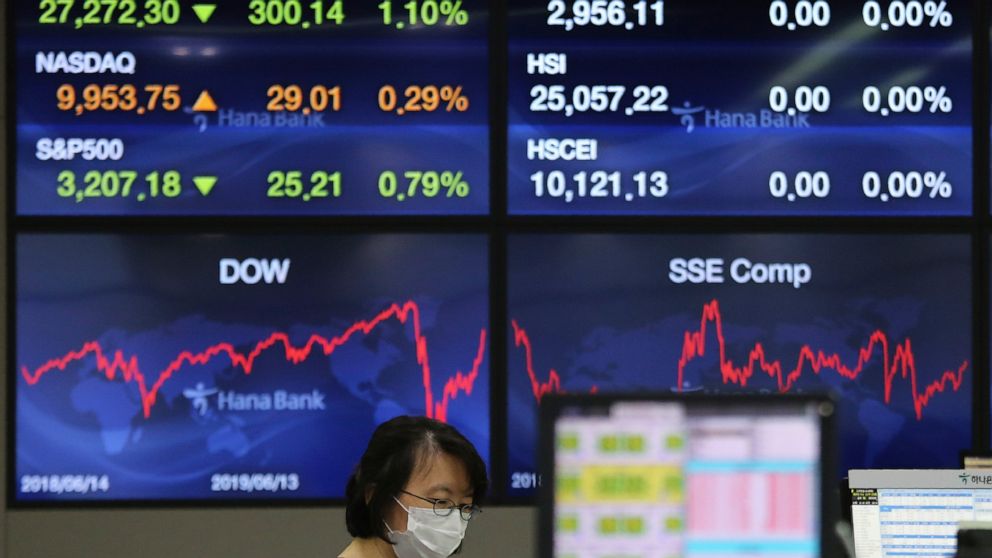Wall Street is off to a mixed start ahead of Fed statement
Stocks are off to a mixed start on Wall Street as traders turn cautious ahead of a policy announcement on interest rates later Wednesday from the Federal Reserve
By
The Associated Press
June 10, 2020, 2:18 PM
4 min read
4 min read
BANGKOK — Stocks are off to a mixed start on Wall Street as traders turn cautious ahead of a policy announcement on interest rates later Wednesday from the Federal Reserve. The S&P 500 was up 0.1% in the first few minutes of trading. The index has staged a huge comeback since its late March low and is now within just 5% of the all-time high it reached in February, before the coronavirus lockdowns started happening. Global markets were also mixed after the Organization for Economic Cooperation and Development said the coronavirus crisis has triggered the worst global recession in nearly a century. Bond yields fell.
THIS IS A BREAKING NEWS UPDATE. AP’s earlier story is below:
World shares turned lower on Wednesday after a downbeat forecast for the global economy and as investors awaited the outcome of a Federal Reserve policy meeting.
Markets in Europe and Wall Street futures shed their gains and were largely down for the day after the Organization for Economic Cooperation and Development said that the world economy is forecast to shrink by 6% this year in a best-case scenario, with only a modest pick-up next year.
The estimate, which is based on an analysis of the latest global economic data, suggests an even sharper decline of 7.6% if there is a second wave of coronavirus contagions this year.
The CAC 40 in Paris surged 0.5% to 5,070 while Germany’s DAX dropped 0.5% to 12,560. The FTSE 100 in Britain, which the OECD estimated would see the sharpest economic drop in the developed world, fell 0.2% to 6,321.
The future contract for the Dow future lost all its gains and was down a few points, while the S&P 500 futures were up 0.1%.
Investors will next look to the Fed. It is not expected to make major policy changes, analysts say. But it will provide its estimates for future economic growth, inflation and unemployment.
Fed Chair Jerome Powell is expected to say in a news conference that the U.S. economy remains in need of extraordinary help despite recent despite glimmers of a possible recovery, including a government report showing that employers added rather than slashed jobs in May.
The Federal Reserve’s promise of immense, unprecedented amounts of aid helped launch the recent stock market rally, and investors want to see the central bank’s reaction to a recent upturn in U.S. jobs numbers.
“One feels that it would not take much to spark a temporary rush for the exit door from the fast-money mob,” said Jeffrey Halley of Oanda.
Japan’s Nikkei 225 index edged 0.2% higher to 23,124.95 after the government reported a sharp drop in machinery orders in April. South Korea’s Kospi rose 0.3% to 2,195.69.
Sydney’s S&P/ASX 200 added 0.1% to 6,166.90, while the Hang Seng in Hong Kong lost less than 0.1%, to 25,049.73. India’s Sensex climbed 0.6% to 34,164.59.
The Shanghai Composite index dropped 0.5% to 2,942.16 after data showed a drop in producer prices and lower than expected inflation in April.
Overnight, the S&P 500 fell 0.8%, its largest loss in almost three weeks. A day earlier, it had turned positive for the year for the first time since February.
Skeptics have been saying for weeks that the rally may be unsustainable given uncertainties over how quickly economies can recover from the pandemic when the numbers of infections and fatalities are still rising in many countries.
Apart from unabated numbers of infections in some U.S. states, experts worry surging numbers of coronavirus cases in developing regions with shaky health systems could undermine efforts to halt the pandemic.
India, Pakistan, Brazil, Mexico and South Africa are among the countries easing lockdown restrictions before their outbreaks have peaked and without detailed surveillance and testing systems in place.
The yield on the 10-year Treasury yield was steady at 0.80%, down from 0.83% late Tuesday. It tends to move with investors’ expectations of the economy and inflation, though it’s still well above the 0.64% level where it started last week.
Oil prices fell back on Wednesday, with benchmark U.S. crude oil for July delivery down 97 cents at $37.97 per barrel in electronic trading on the New York Mercantile Exchange. It gained 75 cents to $38.94 a barrel on Tuesday. Brent crude oil for August delivery gave up 80 cents to $40.38 a barrel.
In currency markets, the dollar slipped to 107.31 Japanese yen from 107.74 yen on Tuesday. The euro rose to $1.1385 from $1.1338.
![]()


